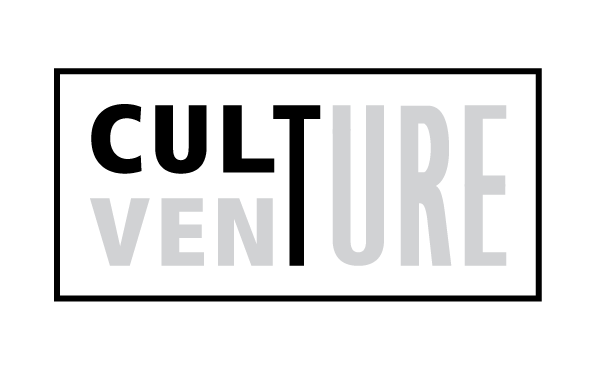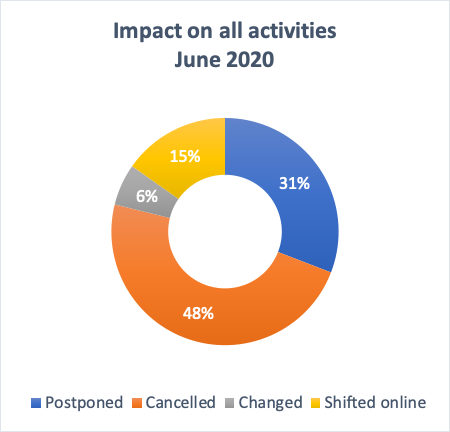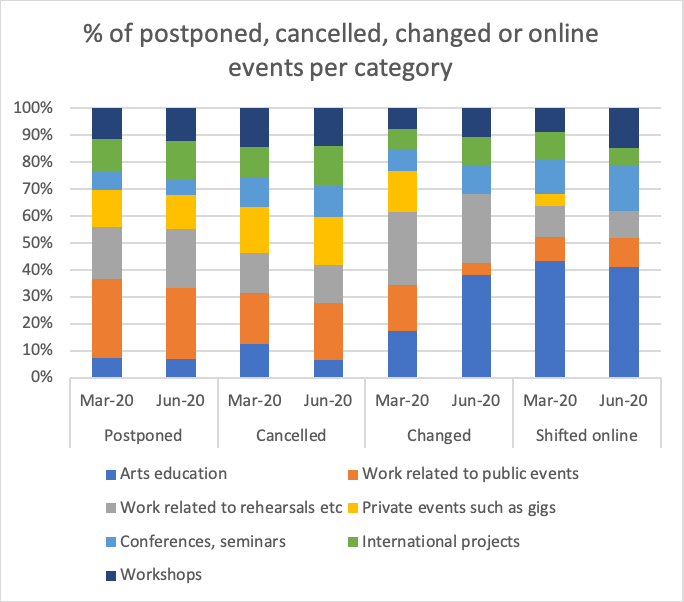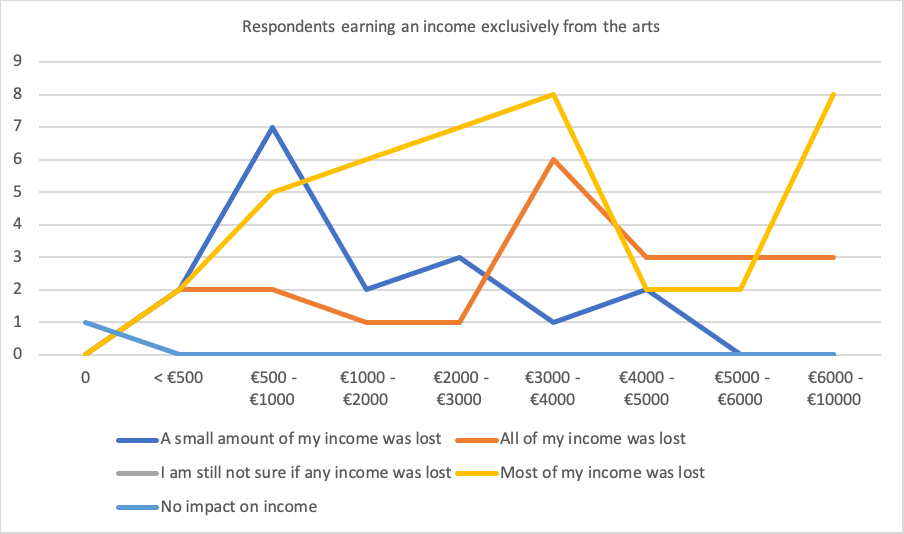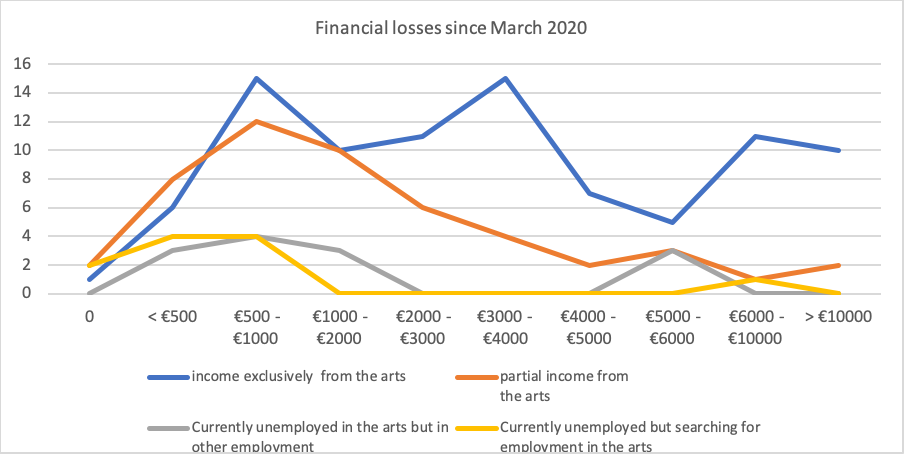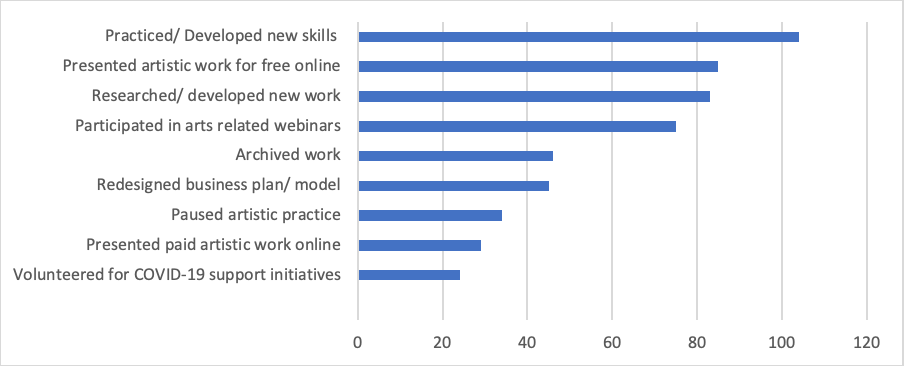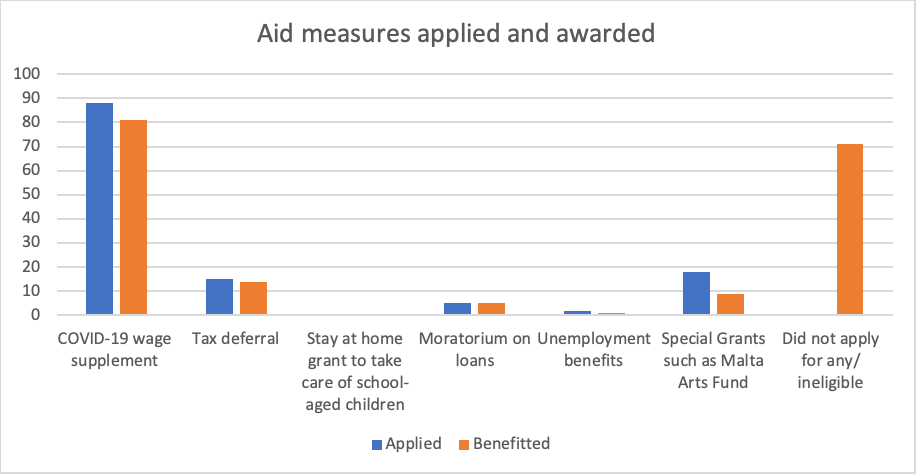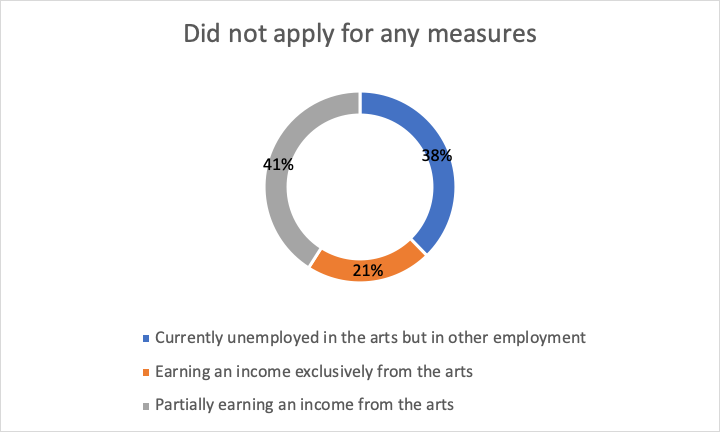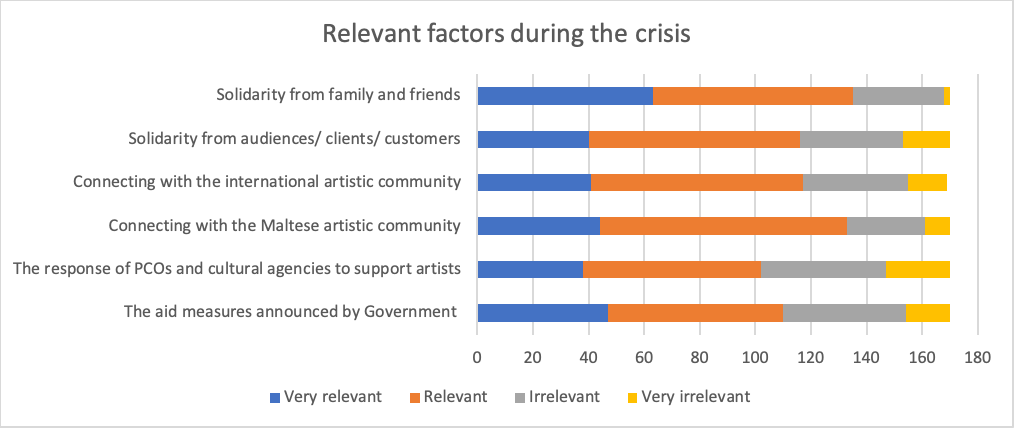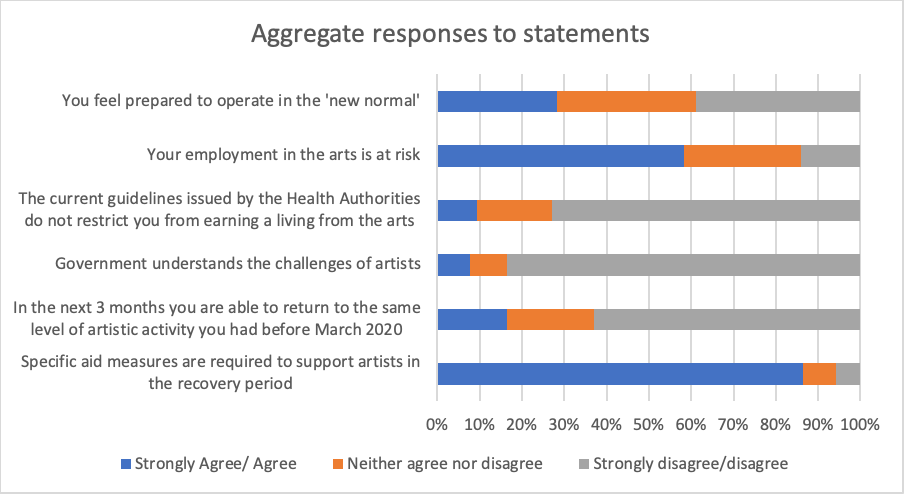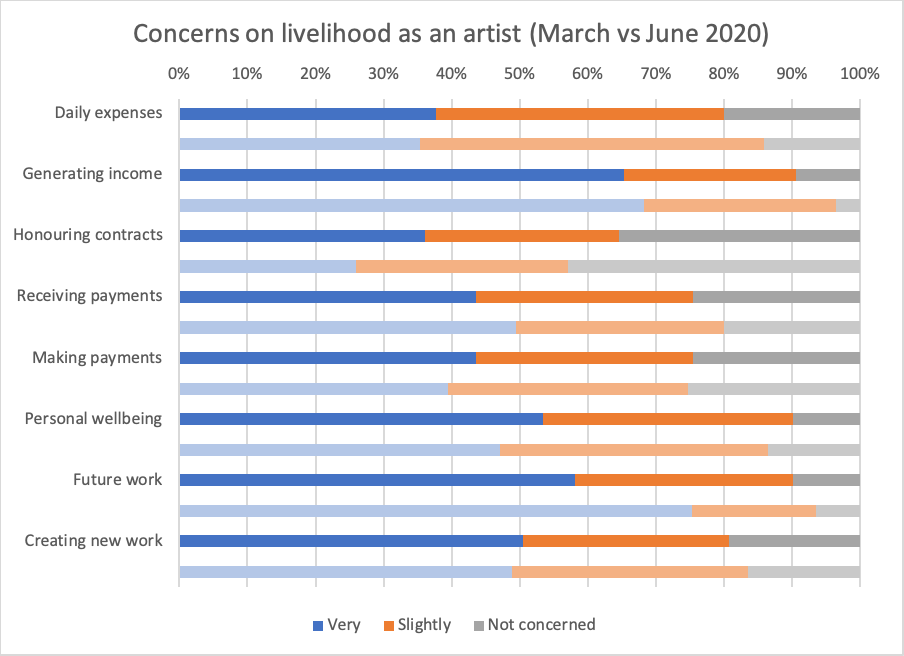Results of the second survey on the impact of COVID-19 on artists in Malta.
Since the start of the pandemic, Culture Venture has been actively supporting the arts in Malta with research, training and investment. The second survey on the impact of COVID-19 on artists was held three months after the first opt-in online survey was launched in March 2020. The second survey was held between the 15th of June and Sunday 21st June 2020. 526 responses were registered for both surveys. The second survey received 180 responses with 51.7% of respondents stating that they had also participated in the first survey. The trends emerging from the first survey were also similar to the trends emerging in Menorca and Malaysia, using the same methodology and survey provided by Culture Venture. The opt-in research methodology cannot provide precise comparative trends of both groups, however the emerging patterns and observations, especially those registering significant shifts deserve attention.
The intention of this survey is to support the sector and all relevant authorities to engage in a collaborative process that will provide a sustainable recovery plan for the sector. Of the 805 registered full-time under the creative, arts and entertainment activities (Jobs Plus, 2020), 414 are self-employed, 203 are employed in the private sector and 188 in the public sector. This recovery plan is required to safeguard 77% of all those employed privately or self-employed in the creative, arts and entertainment activities. In addition, the 1205 employees, registered part-time in these sectors cannot be disregarded. This plan must also include clarity on measures for open air and closed arts venues in order to secure the confidence and safety of producers, artists, crew and audiences to reengage with arts.
The arts were the first to shut down and will be the last to recover. Time is running out.
Main observations from the responses to the survey:
- In the past 3 months online activity increased however, 48% of all events remained cancelled and 31% of all events postponed, mostly for public artistic events, such as performances, exhibitions and concerts.
- Since March 2020, 52% of those claiming to have lost all income registered losses of between €3000 to €4000.
- Artists remained active during this period by developing new skills, presenting artistic work online for free and researching or developing new work.
- COVID-19 wage supplement was the most beneficial measure. 42% didn’t apply for any measure or were ineligible.
- Solidarity from family and friends and connecting with other artists were the most relevant to support artists during this time. The response of PCOs and cultural agencies was the least relevant.
- 86% of respondents agree or strongly agree that specific aid measures are required to support artists in the recovery period. 84% believe that government does not understand the challenges of artists.
- 73% agree or strongly agree that current guidelines are restricting them from earning an income from the arts.
- 58% of respondents believe that their employment in the arts is at risk.
- Future work increases as a concern for artists and generating income remains a major concern.
In this survey, 50.6% of respondents claimed to earn an income exclusively for the arts, 27.8% partially earned an income from the arts, 10% are currently unemployed in the arts but in other employment, 6.1% currently unemployed but searching for employment in the arts. 5.6% of respondents stated that they did not earn any income from the arts and these responses were discarded for the analysis of the survey.
Respondents mainly identified themselves to be mainly employed in theatre, arts education and music. Arts education was added as a new category in this survey.
92.9% of respondents claimed that their work has been negatively affected by COVID-19, 4.1% were not impacted and 2.9% expressed a positive impact on their work. The first survey had indicated a negative response of 95.7%.
Increased online activity, 48% remained cancelled, 31% postponed.
Respondents register 794 different type of activities across 7 different categories that experienced changes and 79 events that did not change. Similar to the March 2020 survey the absolute majority of events were either postponed or cancelled. Online activity registered a 15% share of total activity when compared to 5% in March 2020.
Similar to the March 2020 survey, earned income from public artistic events, such as performances, exhibitions and concerts, was the activity that registered the most responses. As a percentage of all events which were cancelled, postponed, changed or shifted, it is interesting to note that unlike the March 2020 survey that registered activity for private events as changed or shifting online, this survey registers no activity for these two. The similar patterns in activity and impact, registered in both surveys indicates that the impact on events, other than the shift to online for arts education, conferences and workshops, remained significantly the same over the three-month period. It also indicates that the impact of the activity registered in March 2020 remained relatively unchanged in June 2020. This suggests that the fate of most artistic activity was already defined during the early days of the pandemic with limited shifts in activity over the 3 months period. It also provides further evidence that a strategically-led arts-recovery programme is required to allow the sector to emerge from the current hiatus.
Between €3000 to €4000 losses for 52% of those losing all income.
Losses for those earning a living exclusively from the arts, peak in 3 brackets (low, medium and high earnings). Respondents claiming to have lost all income during the past three months, 52% registered a loss in the EUR3,000 to EUR4,000 bracket, an average of between EUR250 and EUR333 per week – reflecting the trend in the forecast of losses registered in the first survey.
Respondents earning partial income from the arts registered losses that peak at the same level of the lower brackets of those earning an income exclusively from the arts. This pattern is also similar to the ones registered in the March survey. These patterns continue to highlight that low income, even below minimum wage, is present in the category of those earning an income exclusively from the arts.
Artists remained active during restrictions
Whereas the survey reveals that all or most of the income was lost, respondents were far from idle and engaged in a number of activities. Developing new skills or practicing skills emerged as the most prominent activity, followed by researching or developing new work and presenting artistic work for free online.
Wage supplement – lifeline for artists.
The COVID-19 wage supplement was the aid measure receiving most responses with 88 respondents applying and 81 claiming to have been successful in benefiting from the measure. Considered to be a lifeline for the sector, it is no surprise that 76% of all respondents claiming benefits from the COVID-wage supplement earn an income exclusively from the arts. This aspect highlights the effectiveness and immediacy of the COVID-19 measure for those earning a living from the arts. A higher trend emerges amongst those who applied for special grants such as the Malta Arts Fund or the theatre deposit. 94% of respondents applying for these grants claim to earn an income exclusively from the arts. However, only half of respondents applying for this measure were successful.
Of those who did not apply for any measures or claimed to be ineligible for any measures, 41% partially earn an income from the arts, 38% are currently in other employment and 21% earn an income exclusively from the arts.
Solidarity from family, friends and other artists.
The majority of respondents identified that all factors were either relevant or very relevant to them. The support network of family, friends and connecting with other artists emerged as important factors for respondents to cope with the pandemic. Solidarity from family and friends followed by aid measures announced by Government and connecting with the Maltese artistic community were the top three identified as ‘very relevant’ to respondents. The response of public agencies and public cultural organisations to support artists, followed by solidarity from audiences, clients or customers were identified the most, albeit in low counts, as ‘very irrelevant’
Employment at risk and a call for specific aid for recovery
86% of respondents agree or strongly agree that specific aid measures are required to support artists in the recovery period. 58% of respondents believe that their employment in the arts is at risk. Of all respondents earning an income from the arts, 52% believe that their employment is at risk. The majority of respondents believe that Government does not understand the challenges of artists. They also believe that the current guidelines are restricting them from earning an income form the arts. In the next 3 months, 63% of respondents will be unable to return to the same level of artistic activity before the pandemic. On the other hand more than 60% feel prepared to operate in the ‘new normal’.
Concern for future work increases
Whereas the March and June surveys correlate similar responses to the majority of concerns, this survey reveals that future work is of more concern to respondents than those in the earlier survey. 67% of respondents claiming to earn an income exclusively from the arts are very concerned about future work. Generating income, creating new work and receiving payments are the other very concerning factors currently impacting all respondents.
